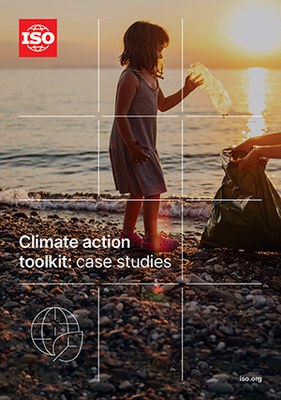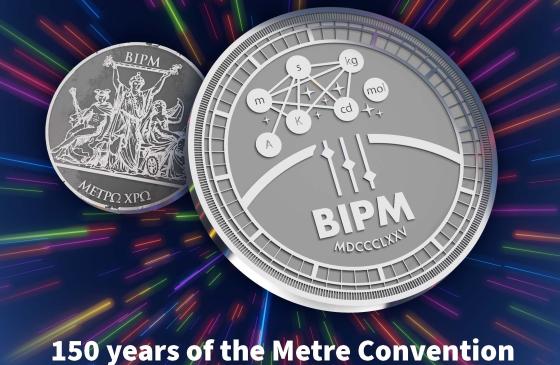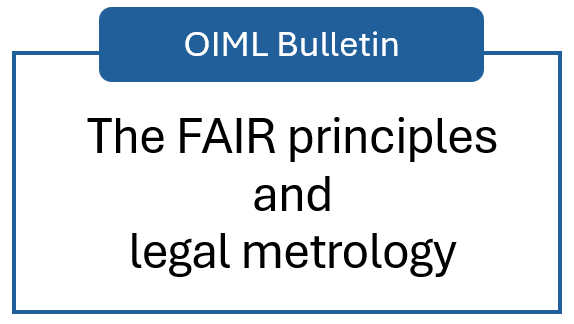OIML BULLETIN - VOLUME LXV - NUMBER 2 - APRIL 2024
Accelerating climate action with ISO standards
Sergio Mujica
ISO Secretary-General
ISO and the OIML have forged a decades-long partnership that has profoundly influenced precision and fairness across industries. Today, the two organizations are strengthening this collaboration with a new MoU. On this year's World Metrology Day, ISO and the OIML stand shoulder to shoulder in working to ensure a sustainable future for all. From trade facilitation to consumer protection, their joint efforts ripple across continents. Here, the ISO Secretary-General, Sergio Mujica, delves deeper into ISO's vision, illuminating its groundbreaking climate commitment and the power of standards to bring about tangible, lasting change.

Sergio Mujica speaking at the ISO Annual Meeting 2023 in Brisbane, Australia
Sustainability challenges
We live in turbulent times. Our world currently faces a number of huge, interconnected challenges, with food shortages, the energy crisis and the effects of global warming causing widespread chaos and suffering. The most vulnerable and unprepared communities are often disproportionately affected.
To mark this year’s World Metrology Day, on 20 May, ISO joins its partners the OIML in focusing on sustainability. Issues such as renewable energy, biodiversity loss and pollution profoundly affect us all. When it comes to establishing a sustainable global economy and environment, it is crucial to have accurate measurements, standardized measurement procedures and a baseline against which to compare figures. In addition, we must be able to trust any resulting data.
International standards offer a clear and practical way for individuals, organizations and governments to implement sustainable practices and help build this trust. They are the measure against which all data can be compared.
ISO standards and sustainable development
Through its members, ISO brings together experts to share knowledge and develop voluntary, consensus-based, market-relevant international standards that support innovation and provide solutions to global challenges.
By supporting our members to actively participate in international standardization and promote the uptake of ISO standards, ISO is helping to meet the United Nations Sustainable Development Goals (SDGs).
ISO standards play an essential role in making these goals a reality, as they support the three pillars of sustainable development: economic, social and environmental.
Firstly, they promote economic sustainability by facilitating fair and transparent international trade, improving countries’ national quality infrastructures and supporting sustainable business practices, from smart farming methods to anti-bribery management systems.
Standards are recognized as an important policy tool by the World Trade Organization (WTO), whose Agreement on Technical Barriers to Trade (TBT Agreement) encourages its member countries to use international standards, such as those developed by ISO and the OIML, as a basis for their national standards and regulations.
Secondly, ISO standards promote social sustainability by helping countries and communities to improve the health and well-being of their citizens. They cover all aspects of social welfare, from healthcare systems and related products to social inclusion and accessibility. They can also ensure that medical data is both accurate and reliable.
Finally, ISO standards promote environmental sustainability by helping businesses and countries to manage their environmental impact. They cover aspects such as implementing environmental management systems, measuring and reducing emissions and energy use, and encouraging responsible consumption. Standards can also specify, monitor and assess mitigation strategies to counter the effects of climate change.
Sergio Mujica spoke on a panel at the AI House during Davos 2024
ISO’s climate commitment
Climate change is the single largest threat facing humanity and the planet. We are on course to miss our target of making deep cuts to greenhouse gas (GHG) emissions by 2030 in order to avoid a global temperature rise of more than 1.5 degrees Celsius. According to the Intergovernmental Panel on Climate Change (IPCC), the effects of this increase will be unavoidable multiple climate hazards.
Without urgent and drastic changes to the way we live and work, at every level of society, the world faces climate calamity.
For this reason, ISO and its members have pledged to align our standards with climate action.
Within its portfolio of over 25 000 international standards, ISO has the necessary tools for any entity involved in the fight against climate change and working towards achieving SDG 13.
For example, international standards play an important role in assisting communities, organizations and industries in the transition to cleaner, renewable energy sources. They can also help to preserve biodiversity while opening up markets for innovations that address global environmental challenges.
ISO’s climate commitment, embodied in the London Declaration of 2021, promises to embed key climate considerations into the planning, drafting, revision and updating of ISO standards and other deliverables in the key fields of energy, transport and building and construction.
This commitment is reflected in ISO’s Strategy 2030, which includes a strategic priority on advancing environmental sustainability through ISO standards.
As a result, all existing and new ISO management system standards (MSS) now include climate change considerations. This initiative addresses the need to consider the effects of climate change on the ability to achieve the intended outcomes of management systems.
The role of ISO standards in climate action
The reduction of GHG emissions is crucial if we are to effectively tackle the climate crisis and reach the world’s net-zero emissions targets. To achieve this, it is vital to accelerate the decarbonization of energy-intensive industries. The pathway to industrial decarbonization is supported by ISO’s technical committees on environmental management and energy management and savings.
The standards they produce apply the theory that, in order to control an activity, we first need to measure it. They are founded on the principles that apply to all ISO standards: harmonization, consistency, comparability, traceability and, above all, validity.
The ISO portfolio on GHGs is aligned with the Greenhouse Gas Protocol, a global standard for measuring and managing GHG emissions, and compatible with most GHG programmes. Our standards provide businesses and organizations with guidance and tools to effectively assess, validate and verify their GHG emissions in order to better manage and control them. Principles, requirements and guidelines for quantifying and reporting the carbon footprint of products are also specified.
At last year’s COP28 climate conference, ISO launched a flagship technical specification establishing a methodology and analytical framework to determine the GHG emissions related to the production, conditioning and transportation of hydrogen up to the consumption gate. This document facilitates the harmonization of public policies and the establishment of a framework for low-emission or decarbonized hydrogen, which is essential for cross-border trade.
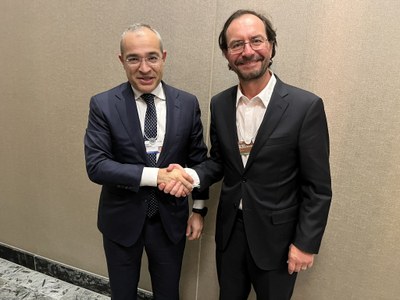
COP28 - Sergio Mujica shakes hands with the Minister of Economy of Azerbaijan, Mikayil Jabbarov
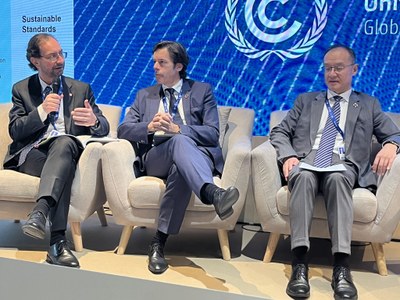
COP28 - Sergio Mujica reaffirmed ISO’s commitment to promoting Green Digital Action through standards
Meanwhile, ISO’s management system standards are empowering businesses to make meaningful changes. For example, ISO 14001 steers organizations towards efficient environmental management systems, while ISO 50001 helps them drive energy efficiency and renewable energy adoption. ISO standards are a guide towards conserving our planet's precious resources, which are vital for both human survival and ecosystem health.
One of ISO’s most powerful tools in the fight against the climate crisis is our Net Zero Guidelines. These can be used by policy makers and all those who work towards net zero GHG emissions for their business, group or country.
The Guidelines are a major signpost on the route to a world in which GHG emissions are reduced to the minimum and balanced by removals. Competing approaches and concepts of net zero sow confusion; the Guidelines provide a common reference for collective efforts, offering a global basis for harmonizing, understanding and planning for net zero for actors at the state, regional, city and organizational levels. They are currently in the process of becoming a full international standard.
While standards exist to cover different aspects of a climate initiative, conformity assessment provides accountability and assurance that the specifications within these standards are being met. CASCO, the ISO committee on conformity assessment, develops policy and standards in this field, thus helping to create coherence, trust and accountability related to non-financial disclosure.
Collaboration and strategic partnerships
Collaboration lies at the heart of what ISO does; an inclusive approach is fundamental to developing and drafting our standards. Only by involving everyone – particularly from underrepresented developing countries – can we help build a better future for all. ISO engages with a wide range of stakeholders to create standards that are consensus-based and global in their reach. This approach transcends national borders while providing economic, environmental and social benefits.
By offering a platform through its members to experts from every sector imaginable, from AI to healthcare management, from sustainable tourism to cybersecurity, ISO ensures that all stakeholders are represented. Their effective participation in standards development contributes to the global relevance of ISO standards and helps realize ISO’s vision of making lives easier, safer and better.
The collaboration between ISO and the OIML goes back many decades, and is currently in the process of being extended even further. In addition to working with CASCO, the OIML contributes and adds their voice to relevant technical work, such as the recently revised ISO/IEC 17025, designed to help laboratories enhance the credibility of their testing and calibration work. It is a partnership ISO values highly.
Fostering strategic partnerships is central to ISO’s initiatives and key to effective climate action. ISO recently partnered with the United Nations Development Programme (UNDP) to step up our sustainability efforts. This involves collaborating on projects which will enhance international standards that advance sustainability actions in both the public and private sectors.
Key projects include a forthcoming guidelines document intended to help organizations manage and optimize their contributions to the SDGs. ISO is also developing the first management system standard directly addressing the SDGs. One of its basic principles will be ‘leave no-one behind’ – how organizations can maximize their positive impacts and minimize their negative impacts by embedding sustainability into decision-making and operations.
ISO has also partnered with the UN Commission for Human Rights on its newly revised standard on sustainable event management, resulting in an annex dedicated to human rights – something unique in ISO standards.
Now, more than ever, multi-stakeholder collaboration is crucial. ISO is committed to working with reporting, disclosure and standards bodies to ensure cohesion so that organizations and policymakers can plan, act and report on their climate initiatives. Harmonization and alignment across the standards ecosystem accelerates the achievement of the Paris Agreement, the SDGs and the United Nations Call for Action on Adaptation and Resilience.
Upcoming engagements
This year’s ISO Annual Meeting will be held in Cartagena de Indias, Colombia, in September. It is the world’s premier event for the global standards community, offering a chance to engage in constructive dialogue about the most pressing challenges facing our planet today, as well as seeking collaborative solutions. Climate action is one of the key focal points for the week, therefore ISO encourages all those who have an interest in how standards can make a difference to register to attend, either in person or online.
In November, ISO will once again be actively participating at the UN Climate Change Conference, COP29, held in Baku, Azerbaijan. After the success of our Standards Pavilion at COP28, this year’s event will provide another opportunity to connect with policymakers and stakeholders from around the globe to showcase ISO standards as a critical tool for transforming climate commitments into effective action.
Towards a sustainable future
The threats to our climate and environment from global warming and humanity’s unsustainable practices are profound. Our very existence as a species is at stake. This calls for urgent and meaningful collaboration towards common goals.
International standards establish a solid foundation for global climate action, setting international benchmarks to enhance the impact of any initiatives. Their widespread uptake helps ensure that countries worldwide share a common language for addressing climate change and tracking its progress.
Now is the time to place our faith in the power of metrology and standards, working together to ensure a more sustainable future. In doing so, ISO can help preserve the beauty and diversity of the natural world for the benefit of humankind and the planet itself.
About ISO
ISO, the International Organization for Standardization, brings global experts together to agree on the best way of doing things – for anything from making a product to managing a process. As one of the oldest non-governmental international organizations, ISO has enabled trade and cooperation between people and companies the world over since 1946. The International Standards published by ISO serve to make lives easier, safer and better.
Resources:
https://www.iso.org/about-us.html
Related ISO standards:
ISO 14001:2015 - Environmental management systems — Requirements with guidance for use
ISO 50001:2018 - Energy management systems — Requirements with guidance for use


